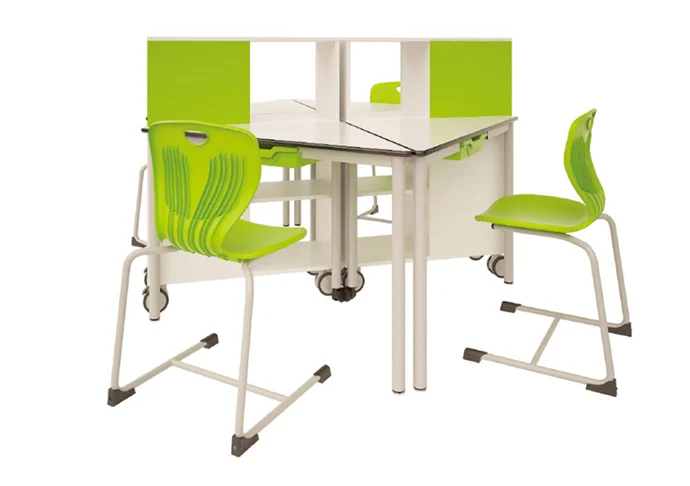Why Modular Student Desks Are the Future of Learning Environments
多行文本内容元素
富文本内容绑定数据后可解析HTML语言内容
Release time:
Jul 12,2025
Summary:Why Modular Student Desks Are the Future of Learning Environments
Table of Contents
Introduction to Modular Student Desks
Benefits of Modular Desks in Educational Settings
Flexibility and Adaptability: Key Features
Enhancing Collaboration in the Classroom
Promoting Individual Learning Styles
Design and Aesthetics of Modular Student Desks
Sustainability and Materials Used
Case Stud
Why Modular Student Desks Are the Future of Learning Environments
Table of Contents
- Introduction to Modular Student Desks
- Benefits of Modular Desks in Educational Settings
- Flexibility and Adaptability: Key Features
- Enhancing Collaboration in the Classroom
- Promoting Individual Learning Styles
- Design and Aesthetics of Modular Student Desks
- Sustainability and Materials Used
- Case Studies: Successful Implementation in Schools
- The Future of Learning Environments
- Conclusion
- FAQs
Introduction to Modular Student Desks
In today’s rapidly evolving educational landscape, traditional classroom setups are increasingly seen as outdated. **Modular student desks** have emerged as a revolutionary solution, designed to meet the diverse needs of modern learners. These desks are not only versatile but also foster an environment conducive to collaborative learning. By exploring the characteristics and benefits of modular desks, we can understand why they are the future of learning environments.
Benefits of Modular Desks in Educational Settings
The transition from fixed to modular desks offers numerous advantages. Here are some key benefits that make modular desks a compelling choice for schools:
1. Enhanced Collaboration
Modular desks are designed to be rearranged easily, allowing teachers and students to create various layouts. This adaptability promotes group work and collaboration, essential in fostering social skills and teamwork.
2. Improved Engagement
With the ability to configure desks into different arrangements, students can engage more actively with their peers and teachers. This dynamic setup keeps students interested and focused, leading to better academic outcomes.
3. Space Efficiency
Modular desks can be moved and reconfigured to maximize the use of space. This is particularly useful in smaller classrooms, where flexibility can optimize flow and accessibility.
Flexibility and Adaptability: Key Features
One of the standout features of modular student desks is their inherent **flexibility**. This quality allows educators to adapt the learning environment based on various teaching styles and classroom activities.
1. Configurable Designs
Manufacturers offer a variety of designs, from rectangular to circular, allowing teachers to select the most suitable configuration for different lessons. The choice of shapes and sizes can significantly impact how students interact with each other and the lesson material.
2. Mobility and Ease of Use
Many modular desks come equipped with wheels, making them easy to move. This mobility facilitates quick transitions between activities or lessons, ensuring that valuable class time is not wasted.
Enhancing Collaboration in the Classroom
Collaboration is a cornerstone of effective learning. Modular desks facilitate various collaborative activities, encouraging students to participate actively.
1. Group Work Dynamics
With modular desks, students can be grouped based on their specific needs or project requirements. This flexibility encourages a sense of community and belonging among students, which can improve motivation and learning outcomes.
2. Peer-to-Peer Learning
When students work together at modular desks, they can easily share resources, discuss ideas, and provide feedback to one another. This peer-to-peer interaction enriches the learning experience and fosters critical thinking skills.
Promoting Individual Learning Styles
Every student learns differently. Modular student desks allow teachers to cater to various learning styles effectively.
1. Personal Space
With modular designs, students can create personal working spaces that suit their preferences. This personalization can make students more comfortable and focused, leading to improved learning outcomes.
2. Differentiated Instruction
Teachers can easily adjust the arrangement of desks to support differentiated instruction. Whether through small groups, paired work, or individual desks, modular setups allow for customized teaching approaches.
Design and Aesthetics of Modular Student Desks
The design of modular student desks plays a significant role in their functionality and appeal.
1. Modern Aesthetic
Modular desks often boast contemporary designs that can enhance the overall aesthetic of a classroom. This modern look can create a more inviting and stimulating learning environment.
2. Variety of Finishes
Available in various finishes and colors, modular desks can be selected to match school branding or classroom themes, contributing to a cohesive atmosphere that reflects the school's identity.
Sustainability and Materials Used
As educational institutions increasingly prioritize sustainability, the materials used in the production of modular desks have become essential considerations.
1. Eco-Friendly Materials
Many manufacturers are adopting eco-friendly materials to produce modular desks, ensuring that their products are not only durable but also environmentally responsible.
2. Lifespan and Durability
Investing in high-quality modular student desks made from sustainable materials ensures a longer lifespan, reducing waste and the need for frequent replacements.
Case Studies: Successful Implementation in Schools
Numerous schools have successfully integrated modular student desks into their classrooms. Here are a few examples of how these desks have transformed learning environments:
1. Innovative Elementary School
An innovative elementary school in San Francisco replaced traditional desks with modular designs. As a result, teachers reported increased student engagement and collaborative learning during group projects.
2. Adaptive High School Program
A high school in New York implemented modular desks as part of an adaptive learning initiative. The flexible arrangements allowed for varied instructional methods, leading to improved academic performance.
The Future of Learning Environments
The future of education is undoubtedly intertwined with the evolution of classroom furniture. Modular student desks represent a shift toward more adaptable, student-centered learning environments.
1. Technology Integration
As technology becomes an integral part of education, modular desks can be designed to accommodate tech tools. Built-in charging ports and cable management systems can enhance the learning experience.
2. Expanding Learning Spaces
With the growing emphasis on collaborative and project-based learning, modular desks are likely to become more prevalent. Schools will continue to explore innovative designs that promote flexibility and adaptability.
Conclusion
Modular student desks are not just a trend; they are a vital component of modern learning environments. With their flexibility, adaptability, and focus on collaboration, these desks cater to the diverse needs of today’s learners. As educational institutions continue to embrace innovative furniture solutions, modular desks will undoubtedly play a significant role in shaping the future of education.
FAQs
1. What are modular student desks?
Modular student desks are versatile furniture pieces that can be rearranged and combined to accommodate various classroom layouts and teaching methods.
2. How do modular desks enhance student collaboration?
Modular desks can be easily grouped or configured in different ways, facilitating collaborative activities and promoting teamwork among students.
3. Are modular student desks environmentally friendly?
Many manufacturers produce modular desks using sustainable materials, ensuring they are eco-friendly and durable for long-term use.
4. Can modular desks support different learning styles?
Yes, modular desks allow for personalized configurations that cater to various learning styles, ensuring that all students can engage effectively.
5. What are the design options available for modular desks?
Modular desks come in various shapes, sizes, and finishes, allowing schools to choose designs that match their aesthetic preferences and classroom needs.


